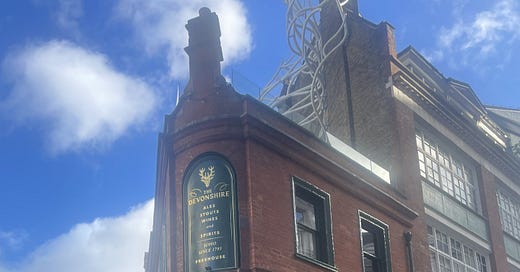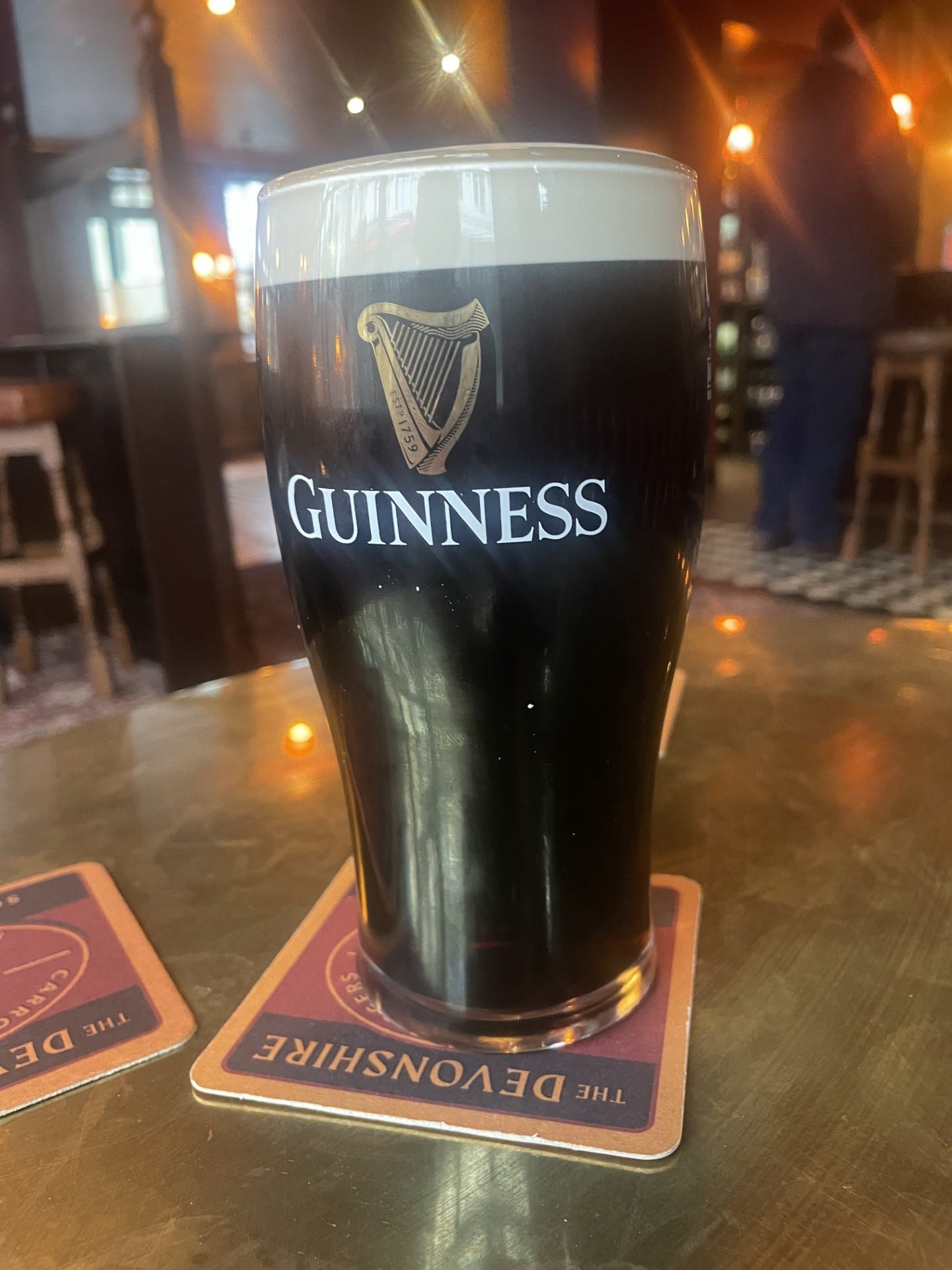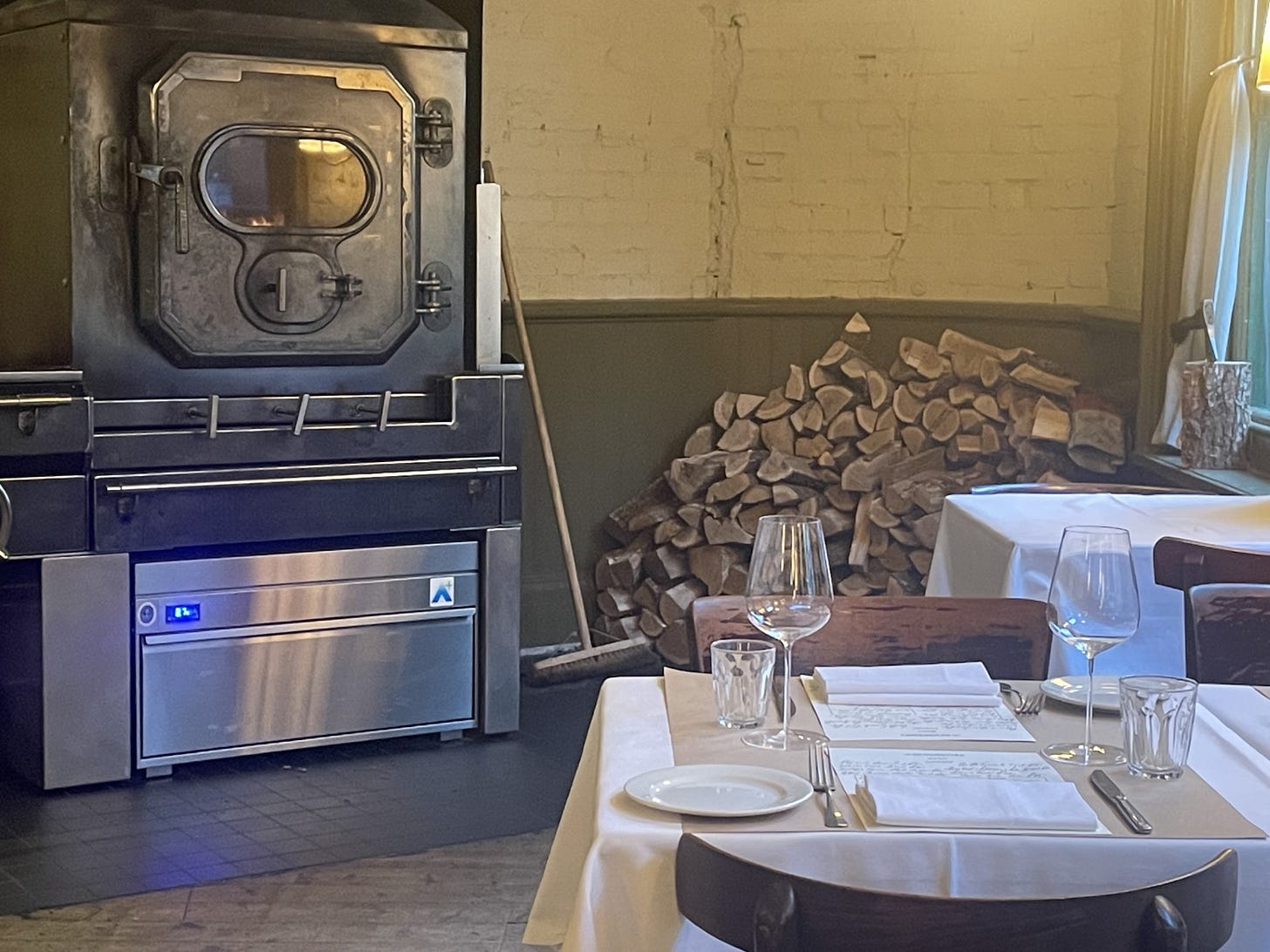Shop doorways and canopies were full of stragglers trying to escape the downpour that was soaking central London. Roads had turned into rivers and the neon of Piccadilly Circus was providing a noirish, Blade Runneresque atmosphere on what was, in fact, a mundane Tuesday lunchtime.
Nestling on a corner site in Soho, dwarfed by nearby architectural behemoths and just a few yards from the Eros and the lights, was the Devonshire. It’s a deceptive place. From the outside, it looks somewhat bijou but, entering through the front doors right on the corner, it opens like a pair of arms offering a warm embrace; a refuge to watch the pools gather in the streets outside.
The Devonshire, just open a handful of weeks now, is a pub done well. There is no music, just a hum of quiet chatter. A familiar, patterned, carpet covers much of the bar, bare floor the rest. There are slightly askew fabric wall lights. Much of it feels like a knowing nod to Greek Street’s Coach & Horses - a longtime favourite of the landlord Oisin Rogers. But there are smarter touches; three leather-bound banquette snugs are hidden behind the bar (again, only accessible through a space in the bar, like the upstairs rooms of the aforementioned Coach). And deeper, is another room, with woodcuts of other pubs and moody photographs of Soho that has already played host to live music events.
A great fuss has been made over the Guinness here and for good reason. They have created two wooden shelves specially for the semi-poured black stuff to settle. Irish barman Sam, who until last year worked at John Kehoes, which boasts of serving the best Guinness in Dublin, is a natural behind the bar; friendly, nothing-too-much-trouble and swiftly learning the names of regulars-in-training. (It’s worth noting, at this point, another great pourer of Guinness was Michael O’Donnell, from Limerick, who worked at the Coach & Horses from 1976 under Norman Balon until 2006).
One of the Guinness shelves says ‘Soho since 1793’ but the site has been poorly used in recent years. The old version of the pub - I think run by Punch - closed in 2012. It has spent time as a Jamie’s Italian and, more recently, something called Coqbull, a chicken and burger joint that, despite its terribly clever name, had its origins in Ireland, though I’m not sure who to blame for their Jammie Dodger cocktail.
Rogers, perhaps the most renowned landlord in London having previously been at the Guinea Grill in Mayfair and the Ship in Wandsworth with Youngs, has teamed up with Charlie Carroll - founder of Flat Iron and the main funder of this project. The pair have also brought in Ashley Palmer-Watts, formerly of Heston Blumenthal’s Fat Duck.
Thus, above the pub, there are two floors of dining rooms, one featuring a large wood fired oven adjacent to ember-fired grills. In the corner is a huge pile of firewood; on the windowsill an axe is embedded in a chopped log.
Unsurprisingly, the food is superb and the menu classical - less Heston, more Fergus perhaps. Scallops with bacon and malt vinegar, potted shrimps with Melba toast and Iberico pork ribs - the last piled on a plate surrounding a still smoking ember from the fire - are among the starters. Mains include various cuts of steak - fillet, ribeye or on the bone - Iberico pork chop and a beef cheek and Guinness suet pudding. There is also a ‘Pile of Langoustine’, the sort of uncomplicated dish that was once presented to travellers dropping in at Les Routiers pitstops in coastal France.
The Devonshire is a place of rebirth and a welcome counterbalance to the usual gloom surrounding the fate of pubs. A report in October, the real estate group Altus, found that 383 pubs closed in the first six months of this year - 46 of which were in London. That compares with 386 pubs closing in the whole of 2022.
Pub owners (pubcos) frequently fall back on claiming the pub itself is ‘not viable’. This is normally code for a lack of investment, the building being more useful as property to service debts than a pub. When the Devonshire last functioned as a pub, it appears to have died a death through a lack of investment and proprietorial care. Online reviews dismiss it as a ‘little dull, functional, pub’ with ‘bland music’ while another claims the food was ‘marginally above that of pet food’.
It is a consistent failure by pubcos to recognise the importance of installing a dynamic landlord or landlady; too few tied houses are decently managed, the role frequently left to unqualified placeholders who have little social investment in the site, the area or the community. Venues, all too often, are allowed to drift to a point of irrelevance. Good pubs should be the crucial, beating heart of a neighborhood.
Near me, the landlord of a landmark pub found himself losing his site. He served excellent pizza, cricket would be on a television during the summer, there were a pair of pool tables and a back room would host live music and comedy. The place had a delightful buzz and was embedded in the community. The pub there now, while it has been invested in heavily by the owners and is much smarter, has lost its soul. The music room has made way for a larger restaurant space, the staff stand listlessly behind the bar and almost look at the customers wondering why on earth they are there. Glasses and plates take an age to be cleared; the food is decent but pricey for pretty standard fare.
Obviously, not many pubs have the financial clout to compete with what the new iteration of the Devonshire is doing; the food is aiming at the high end of the market and while the prices are fair for such excellent produce, some may find them a bit steep - though I should point out good value bar snacks are planned!
Pubcos and wannabe landlords could do little better than to visit The Devonshire - or other terrifically managed pubs like the Prince Regent in Herne Hill, the Eagle Ale House in Battersea, the Jolly Woodman in Beckenham, Franklins in East Dulwich, The Wood House up the steep hill in Sydenham or any of hundreds of others - to see how it is done properly.






